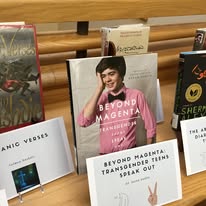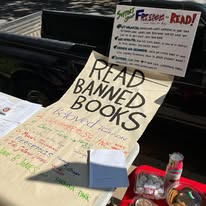A challenge, in censorship terms, is an attempt to remove or restrict access to material in a public space based on the objections of a person or group. For example, George M. Johnson’s memoir, All Boys Aren’t Blue, has been challenged for having LGBTQIA+ and sexually explicit content. Since 2021, the American Library Association (ALA) has tracked substantial increases in censorship attempts, with a record 1,237 challenges in 2023. PEN America recently reported as many as 22,810 instances of books banned in public schools from 2021-2025.
Against this backdrop, a small group of concerned Bucknell University colleagues formed a committee to support Banned Books Week, to raise awareness about expanding censorship efforts and promote the freedom to read.
“We started simply, with a Banned Books Readout in the Traditional Reading Room,” said librarian and Banned Books Week committee chair, Jason Snyder.
Over time, the committee grew to include the Bucknell University library, Bucknell University Press, Bucknell’s Literary Studies Program, and the local used bookstore, Mondragon Books. As the committee expanded, a week-long slate of events grew into being.
Banned books readouts now bookend the agenda with an initial on-campus event and a festive community readout at Mondragon closing out the week.
This year contemporary YA author Jordan Sonnenblick will give a talk on Zoom from the perspective of an author whose work has been banned. Previous presentations included a talk on the publication history of Maus and a screening of the documentary Judy Blume Forever.
In 2024 Banned Books Trivia was added to the schedule, offering a lively jeopardy-style quiz game complete with 80s-style buzzers and catchy categories such as, “The Young and Repressed,” “Kids Shouldn’t Read” and “Whaddayagonnadoaboutit?”
A day of action at the library fills out the week’s events. Students give presentations about book banning attempts in their hometowns, while visitors are encouraged to take a stand against book banning by sending postcards to their local representatives.
The events are spirited and fun, but there is no doubt about the deep concern for the topic at hand. Says Snyder, “Numerous cultural forces want to censor and remove books from schools and libraries, and Bertrand Library stands firm against any form of censorship or book bans.”
Dean of library services Katherine Furlong emphasizes the importance of bringing people together in support of democratic values: “While the freedom to read is the core of a librarian’s profession, it’s also a building block of democracy and our shared responsibility to uphold.”
Publishers, of course, stand alongside libraries, bookstores, and school districts in resisting book censorship and celebrating diverse voices. “Books open minds, deepen empathy, and challenge entrenched perspectives,” says BUP director Suzanne E. Guiod. “Bucknell University Press enacts those values in its own publishing and is honored to stand with library colleagues, Mondragon friends, and the Lewisburg community to protect and promote the right to read.”
One of Bucknell University Press’s own books was targeted in the U.S. Naval Academy library purge earlier this year. Joyce Tolliver’s 1998 monograph about a late nineteenth-century Spanish writer, Cigar Smoke and Violet Water: Gendered Discourse in the Stories of Emilia Pardo Bazán, appeared on the list of titles removed from the library, alongside some 400 other works by writers such as Maya Angelou, Ibram X. Kendi, Maia Kobabe, and Geraldine Brooks.
But, as frequently noted, banning books only tends to make people more curious about them. And indeed, rather than suppressing ideas, censorship has inadvertently fueled a more engaged community here in Lewisburg, strengthening the collective effort of the Banned Books Week committee to champion the freedom to read.


